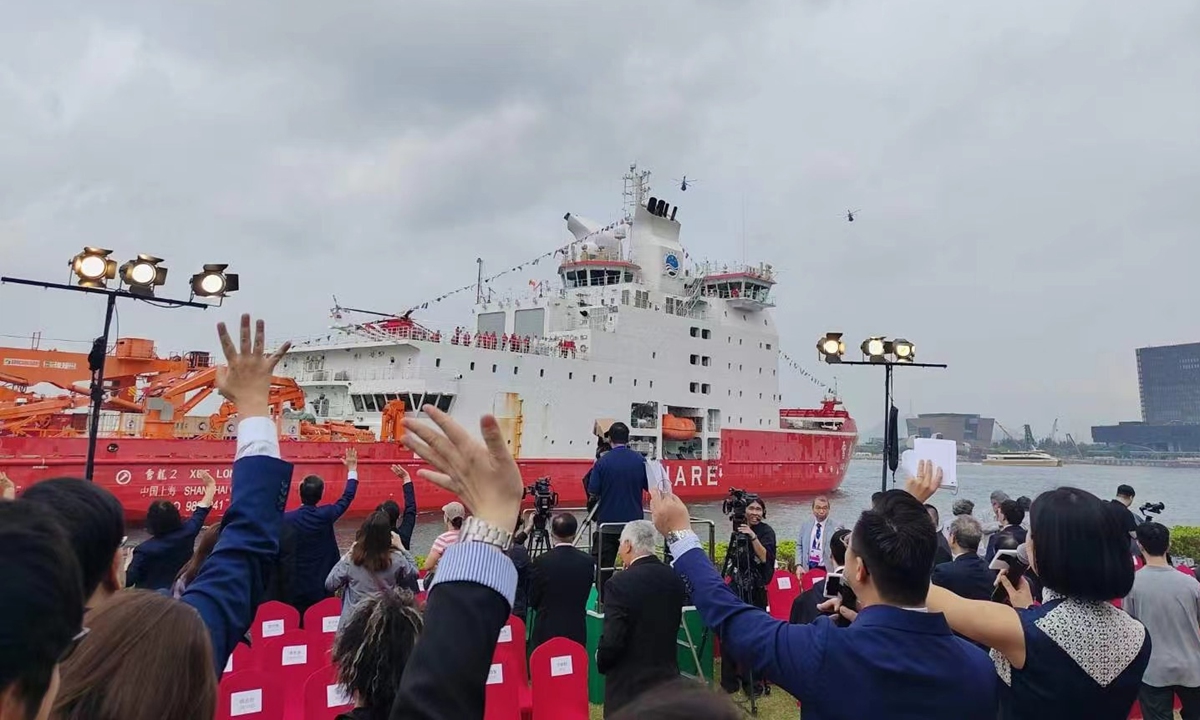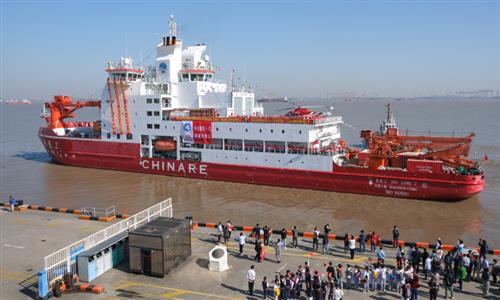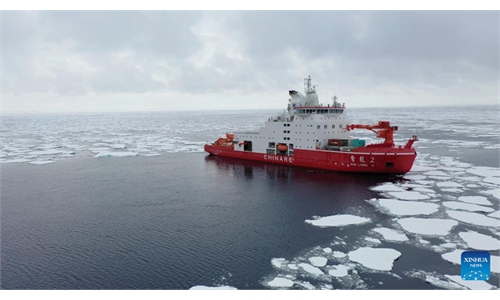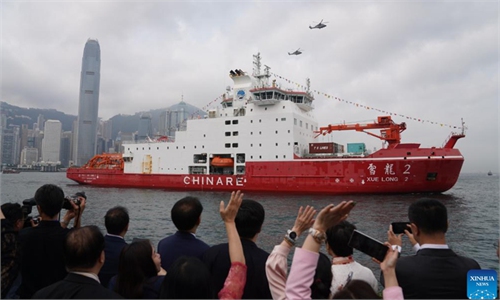
The Xuelong 2, China's first domestically built polar research icebreaker, arrived in Hong Kong on April 8, 2024 for a five-day pit stop amid a warm welcome by local residents. Photo: courtesy of Wong Kam-leung, the chairman of the Hong Kong Federation of Education Workers
The Xuelong 2, China's first domestically built polar research icebreaker, arrived in Hong Kong on Monday morning for a five-day pit stop amid a warm welcome by local residents. This also marks the vessel's first visit to the city as well as the return of a Chinese polar research icebreaker to the city after nearly 20 years since the Xuelong docked in Hong Kong in 2004.
Some local residents in Hong Kong told the Global Times on Monday that they were unable to get tickets to visit the Xuelong 2 due to the overwhelming demand, and some members from a committee organizing the vessel's visit to the city said they believe the event is a rare opportunity for patriotic education and the icebreaker serves as a practical venue for national security education.
The Xuelong 2 was docked at the restricted area of the Tsim Sha Tsui Ocean Terminal. On behalf of local residents, Chief Executive of the Hong Kong Special Administrative Region (HKSAR) John Lee welcomed the crew, shanking hands with each of them, on Monday morning.
Lee said at the welcoming ceremony that the arrival of the Xuelong 2 would enhance the pride of local residents in the national scientific achievements and encourage young people in the city to see the polar expedition teams as role models and to engage in innovation and technology.
The arrival of the vessel comes along with a series of events over five consecutive days, including an open day on the Xuelong 2, scientific exchanges and public science lectures, all aimed at patriotic education and public science communication.
The visit will feature not only Zhang Beichen, the team leader and chief scientist of China's 40th Antarctic Expedition, and Xiao Zhimin, the captain of the Xuelong 2, but also several of the nation's top polar scientists and university professors, according to media reports.
The expedition departed from Shanghai on November 1, 2023, and completed its 159-day mission with the focus on collecting various data in the Ross Sea in Antarctica and establishing the fifth Antarctic research station, the Qinling Station.
Wang Jinhui, the deputy of the expedition, was quoted as saying in local media reports on Monday that the expedition involved more than 460 participants, with no Hong Kong residents directly involved, although some indirectly participated in the development of new instruments and other research activities.
Wang also expressed his hope that more science and technology workers from Hong Kong will be engaging in Antarctic scientific research work in the future.
Ma Fung-kwok, the chairman of the event organizing committee, told the Global Times on Monday that the registration for the visit received an enthusiastic response, with the first two days already fully booked.
Ma said he hopes that in the future he can secure more of the nation's icebreakers to bring more information about Antarctic exploration to Hong Kong and inspire young people to learn more about the country's related work.
Wong Kam-leung, chairman of the Hong Kong Federation of Education Workers, told the Global Times on Monday that he felt very excited when seeing the Xuelong 2 entering Victoria Harbour, and it is also very shocking as the vessel is much larger than he had imagined.
"Many local residents were also there to watch, and take photos. Witnessing the country's powerful equipment firsthand was very thrilling," said Wong, who is also a member of the event organizing committee.
Hong Kong is the first stop of the return trip of the Xuelong 2 to the country. This fully demonstrates the country's care for Hong Kong and for the young people, "which is also a big gift to us," Wong said, noting that the five-day event is a rare opportunity for patriotic education and a practical experiment in national security education.
"The Xuelong 2 was independently developed by our country and has achieved fruitful results after many tests. This visit to Hong Kong will also allow young people in Hong Kong to understand our country's scientific research successes in polar exploration, feel proud of the scientific achievements and enhance the pride of identity among Hong Kong educators and young people," Wong said.
He noted that the event also coincides with the National Security Education Day, which falls on April 15, allowing Hong Kong residents to better understand the importance of polar resources and biological resource security.
Nicholas Muk Ka-chun, a local teacher, told the Global Times on Monday that his school has booked two time slots for visiting the vessel, and he is going to lead a group of 39 students to see the icebreaker on Friday.
"I remember I visited the Xuelong [in 2004] when I was in middle school. This year, with the Xuelong 2 coming to Hong Kong, it can be seen as a legacy," Muk said.
"And I hope the students I lead will cherish this rare opportunity to visit the ship, and I believe this trip will plant the seeds for future scientific and technological innovation," Muk said.




